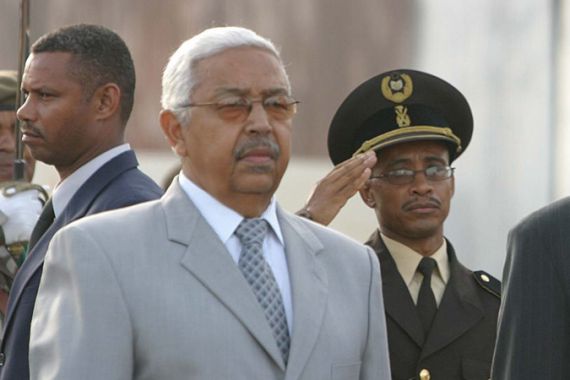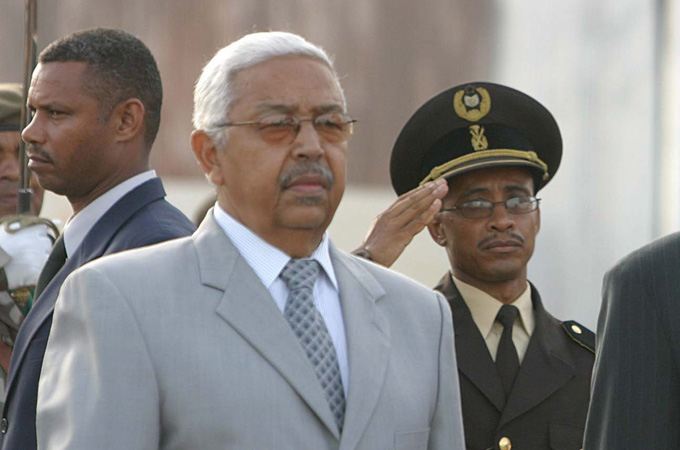Cape Verde’s Pires wins leadership award
Ex-president is first to get Mo Ibrahim award for African governance, the world’s biggest individual prize, since 2008.

 |
| Former President Pires was praised for transforming Cape Verde into a model of democracy [EPA] |
Former Cape Verde president Pedro Verona Pires won the $5m Mo Ibrahim award for African leadership for shepherding his tiny Atlantic Ocean island state from an autocracy to a prosperous democracy.
“Throughout his long career, President Pires has been dedicated to the service of his people, including those in the diaspora, while retaining his humility and personal dignity,” the award committee said in a statement on Monday.
Organisers of the world’s biggest individual prize, established in 2006 by Sudanese telecoms tycoon Mo Ibrahim to improve the quality of African governments, also praised Pires for his decision this year not to run for office again after the expiry of his second term.
“[Pires]is a wonderful man,” Mo Ibrahim, the chair of the Mo Ibrahim Foundation, told Al Jazeera.
“He participated in the liberation struggle for his country. It got its independence, and he was in government. He was prime minister. What [his government] did was introduce multi-party democracy. It didn’t say ‘we are the liberation movement, we own the country’ as many movements unfortunately do in Africa.”
Pires also “managed to take the country out of poverty,” Ibrahim said.
“Cape Verde is the second African country to be taken off the list of the least developed countries by the UN. This is a country with no natural resources, no oil, no diamonds, nothing. This is a small country that has demonstrated without natural resources, but with good governance, they can really move the country forward.”
First winner since 2008
Pires, 77, who led the island nation off Africa’s northwest coast for a decade until last month, is the first winner since 2008 of the world’s biggest individual prize – because no suitable candidate could be found for the past two years.
Speaking from his home in the Cape Verdean capital Praia, Pires told the Reuters news agency: “I accept this award for the 50 years of struggle for independence, democracy and development in Cape Verde, but also for the affirmation of the African and Africa.”
“The prize committee has been greatly impressed by president Pedro Pires’s vision in transforming Cape Verde into a model of democracy, stability and increased prosperity,” committee chairman Salim Ahmed Salim, Tanzania’s former prime minister, told a press conference at London City Hall.
The Ibrahim Prize for Achievement in African Leadership carries a $5m prize paid over 10 years and $200,000 annually for life from then on, with a further $200,000 per year available for 10 years for good causes backed by the winner.
The inaugural prize went to former president Joaquim Chissano of Mozambique in 2007 and Botswana’s ex-president Festus Mogae won in 2008.
The prize goes to a democratically-elected African leader who has served their mandated term and left office in the last three years.
Good governance indicator
The London-based Mo Ibrahim Foundation also publishes an Ibrahim Index, ranking 53 African countries according to 86 indicators grouped under safety and the rule of law, participation and human rights, sustainable economic opportunity and human development.
Cape Verde, which has a population of 500,000, fared well in the “Ibrahim Index” of African governance released alongside the leadership award, moving up two places to second in the 2011 Index.
The five best-ranked countries were Mauritius, Cape Verde, Botswana, Seychelles and South Africa, while the bottom five were Somalia, Chad, Zimbabwe, Democratic Republic of Congo and Central African Republic.
Significant gainers were Liberia and Sierra Leone, climbing to 36th and 30th spots respectively as both West African states continued to distance themselves from civil wars that ended less than a decade ago.
The biggest loser was in the Indian Ocean island of Madagascar, which slipped to 33rd, reflecting the political and economic upheaval that has persisted since a 2009 coup.
Africa’s two areas of poorest progress were “Safety and the rule of law” and “Participation and human rights”.